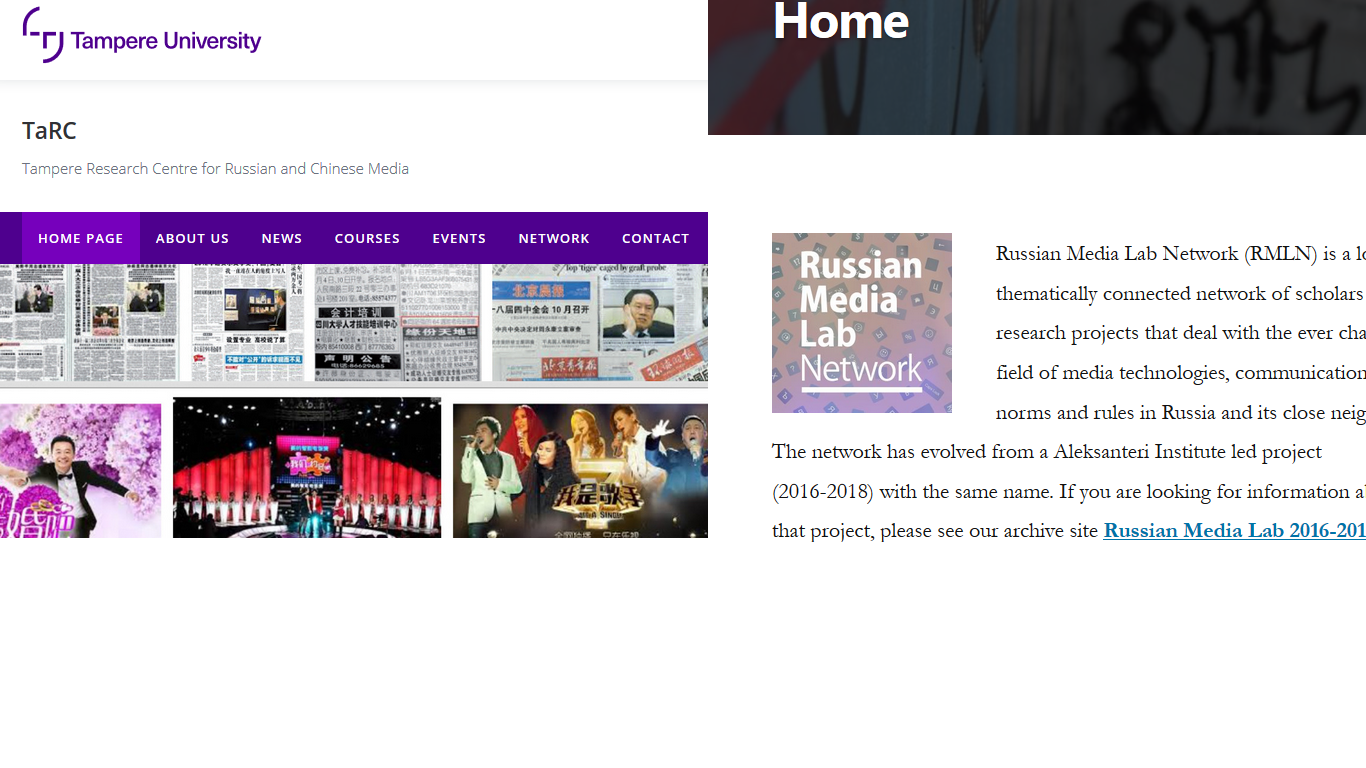TaRC and the Russian Media Lab’s (University of Helsinki) collaborative effort, the Online Talks on Russian Media lecture series, continues in February with another fascinating session!
This time, we will have not only one but three presentations focusing on the development of the Internet in the territory of the former USSR in the Post-Soviet era. All presentations are based on the new anthology Internet in the Post-Soviet Area – Technological, Economic and Political Aspects (Springer, 2023).
Sergey Davydov, editor and contributor to the volume, will present a comparative perspective on Internet development on the vast territory of the former USSR, taking into account the diversity of media systems of these countries and the still significant role of the Runet.
In addition, two contributors, Anastasia Saponova and Sergei A. Samoilenko will join the talk to present their chapters. Saponova will cover media literacy in Central Asia by discussing methodological questions in cross-country research and providing results of cross-country studies conducted in Kazakhstan, Tajikistan and Uzbekistan in 2019 and 2021.
For his part, Samoilenko will delve into cancel culture in contemporary Russian public discourse by examining mainly the cases inspired by the #MeToo movement across different organizational settings. He uses the prism of moral conflict between conservative and progressive worldviews and addresses the concept of novaya etika, a new term used by Russian conservatives and liberals to make sense of debates in the West concerning changing views of history, culture, and morality.
With these presentations, the authors also give us a sneak peek into the edited volume where international experts analyze similarities and differences in various post-Soviet countries throughout the chapters.
The volume consists of two parts. The chapters of the first part examine the post-Soviet area as a whole. The second part includes specific case studies on the development of the Internet, either in individual countries or in groups of countries. The countries analyzed are Estonia, Ukraine, Russia as well as three Central Asian countries: Kazakhstan, Uzbekistan and Tajikistan.
Topics covered in the volume include, but are not limited to measurement, dynamics, and structure of each national Internet audience; the history of the Internet in the post-Soviet countries; development of infrastructure; Internet regulation and institutional aspects; online markets such as telecommunications, online advertising, e-commerce, and digital content; social and cultural aspects; as well as the transformation of the national media systems.
Speakers’ bios:
Sergey Davydov is Professor of Sociology and Social Integration at the HSE University. His research interests include sociology of culture, media and communications, and methodology of social research. He is author of the book Notebook of A Media Sociologist (2020, in Russian) and editor of books Internet in Russia: A Study of the Runet and Its Impact on Social Life (2020) and Internet in the Post-Soviet Area: Technological, Economic and Political Aspects (2023).
Anastasia Saponova is a PhD candidate in social sciences and deputy director at the ZIRCON Research Group. Her primary research interests are media and communication studies.
Sergei A. Samoilenko is assistant professor in the Department of Communication at George Mason University. His research focuses on issues of public character, reputation management, subversive communication, and crisis management. He is a co-founder of the Research Lab for Character Assassination and Reputation Politics (CARP), an interdisciplinary research community studying strategies and tactics of subversive communication and reputation management. He has coauthored and co-edited several books, including Character Assassination and Reputation: Management Theory and Applications (2021), The Routledge Handbook of Character Assassination and Reputation Management (2020), The Handbook of Research on Deception, Fake News, and Misinformation Online (2019), and Media and Public Relations Research in Post-Socialist Societies (2021).
Event info:
The Online Talk will be held on Zoom on Tuesday 13 February, from 12:00 to 13:30 (Helsinki time, GMT+2). The discussion will be moderated by Dr Katja Lehtisaari (Tampere University).
If you wish to participate and receive emails with updates about upcoming Online Talks, please leave your contact information here by Monday 12 February, 18:00 (Helsinki time, GMT+2). If you have already subscribed to the Online Talks mailing list, you don’t need to register again! You will receive further information via email.

